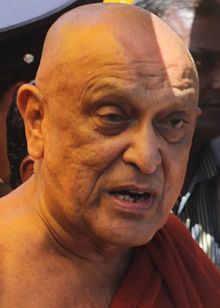Maduluwawe Sobitha Thero
This article contains wording that promotes the subject in a subjective manner without imparting real information. (November 2015) |
Maduluwawe Sobitha Thero | |
|---|---|
පූජ්ය මාදුළුවාවේ සෝභිත හිමි | |
 Sobitha Thero in 2015. | |
| Title | Chief Incumbent of the Kotte Naga Vihara |
| Personal life | |
| Born | Pathirage Don Rathnasekara [1] 29 May 1942 Padukka, Sri Lanka |
| Died | 6 November 2015 (aged 73) Mount Elizabeth Hospital, Singapore |
| Cause of death | Complications from Heart Surgery |
| Nationality | |
| Parent(s) | Pathirage Don Peiris Appuhamy (Father) [1] Kuruwita Arachchige Karalinahami (Mother) [1] |
| Alma mater | Vidyalankara Pirivena University of Sri Jayewardenepura |
| Religious life | |
| Religion | Buddhism |
| Temple | Kotte Naga Vihara |
| School | Theravada |
| Lineage | Siam Sect |
| Dharma names | Ven. Maduluwawe Sobitha Thero |
Maduluwawe Sobitha Thero (Sinhala: මාදුළුවාවේ සෝභිත හිමි; 29 May 1942 – 6 November 2015) was a Sinhalese Buddhist monk regarded for his nonviolent revolutionary leadership example in Sri Lanka. He was the chief incumbent of the Kotte Naga Vihara. [2][3][4][5][6][7]
Personal life
[edit]The Thero was born on 29 May 1942, the Vesak day at the village of Maduluwewa in Padukka, Homagama as Pathirage Don Rathnasekara. He received his education at Maduluwawe Maha Vidyalaya and began to live in the temple when he was 11 in Padukka, under the guidance of his uncle, the head monk. He was ordained a novice monk on the 9th May, 1955, at the Kotte Sri Naga Viharaya. In 1962, the Thero received his higher ordination after studying at the Vidyodaya and Vidyalankara Pirivenas and received his honorary doctorate from the University of Sri Jayewardenepura in 1964. In 1967, the Thero became the chief incumbent of the Kotte Naga Viharaya.[8][9]
The Thero died on 6 November 2015 at the Mount Elizabeth Hospital in Singapore.[10][11] He was 73 at the time of his death. The government announced a state funeral and a day of national mourning.
Social services
[edit]The Thero actively worked against the President (from 1977 to 1988) J. R. Jayawardena's socio-political practices and the latter's efforts to centralize power within the presidency, as well as threats against freedom of expression, civil rights and the rule of law.[12] Thero was one of the most important leaders of the anti-Indian intervention campaign in the late 1980s. His oration mobilised the Sri Lankan populace across the spectrum. His charisma, influence and skill were important in the fight through the National Movement for a Just Society (NMJS) to usher in a democratic government on 8 January 2015 by uniting a divided opposition and the trade unions, rights groups, artists, professionals and academia.[12][13][14]
Sobitha Thero played a key role in bringing a new government to power in 2015 by defeating Mahinda Rajapaksa. He supported the common candidate Maithripala Sirisena for the presidency, Ranil Wickremesinghe to form a new government and campaigned for the release of Sarath Fonseka.[4][15][16][17] The Thero was an ardent campaigner against the executive presidential system of Sri Lanka and acquired a reputation for his stand on social justice and for educating the youth on the dangers of drugs and alcohol abuse.[5][18] He promoted mutual respect and amity between the various religious and linguistic groups of the country.[19][20]
See also
[edit]References
[edit]- ^ a b c Liyanagama, Lakdev (9 November 2015). "A TRIBUTE TO AN ERUDITE MONK". Daily News. Retrieved 14 November 2015.
- ^ Raine Wickrematunge (21 May 2013). And Then They Came for Me: The Lasantha Wickrematunge Story. AuthorHouse. pp. 182–. ISBN 978-1-4817-8991-2.
- ^ "Sobitha Thero's President 'dream' revealed". www.srilankamirror.com. 11 June 2014. Retrieved 23 August 2014.
- ^ a b "Sobhitha Thero suspects moves to stop him". BBC. 7 October 2010. Retrieved 23 August 2014.
- ^ a b "I'm prepared to be the common candidate at presidential election – says Ven. Maduluwawe Sobitha Thero". News1st.lk. 19 June 2014. Retrieved 13 November 2015.
- ^ T. D. S. A. Dissanayaka (1994). The politics of Sri Lanka. Swastika (Private) Ltd. p. 335. ISBN 978-955-572-001-4.
- ^ "Government cautions Sobitha Thero". Colombo Telegraph. July 20, 2014. Archived from the original on 24 July 2014. Retrieved 23 August 2014.
- ^ "Ven. Maduluwawe Sobitha Thera passes away". News1st.lk. 8 November 2015. Retrieved 13 November 2015.
- ^ "The Life Story of Rev Maduluwawe Sobitha Thero". Lanka Video Entertainment (youtube.com). 8 November 2015. Retrieved 13 November 2015.
- ^ "Ven. Maduluwawe Sobhitha Thera passes away". Daily Mirror. 8 November 2015. Retrieved 8 November 2015.
- ^ "SOBITHA THERO'S LEGACY TO BE INCLUDED IN THE SCHOOL SYLLABUS". Hiru News. 10 November 2015. Retrieved 8 November 2015.
- ^ a b "Maduluwawe Sobitha Thero (1942-2015): The Monk Who Ended Sri Lanka's Decade of Darkness". Puvath.lk. 9 November 2015. Retrieved 13 November 2015.
- ^ "Religious leaders say our civilisation at stake". Daily Mirror. 21 December 2012. Retrieved 13 November 2015.
- ^ "Corrupt persons should not be re-elected to Parliament: Ven. Maduluwawe Sobitha Thero". News1st.lk. 3 July 2015. Retrieved 13 November 2015.
- ^ The Monk and the Man who changed history Sunday Observer, Retrieved 4 May 2015
- ^ "Activists attack Fonseka verdict". ucanews.com. 21 November 2011. Retrieved 13 November 2015.
- ^ "Ven. Maduluwawe Sobitha Thero". LankaNewspapers.com. 4 October 2010. Retrieved 13 November 2015.
- ^ "Ven. Maduluwawe Sobitha, the Game Changer". Sri Lanka Guardian. 9 November 2015. Retrieved 13 November 2015.
- ^ Pinto, Leonard (14 July 2015). Being a Christian in Sri Lanka: Historical, Political, Social, and Religious Considerations. BalboaPressAu. ISBN 9781452528632.
- ^ "Ven Sobitha Thero left us when the country needed him most". Colombo Telegraph. 9 November 2015. Retrieved 13 November 2015.
